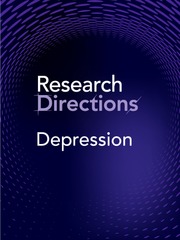Context
The clinical field of depression and other mood disorders is characterised by the vast heterogeneity between those who present for care, and the highly variable degree of response to the range of psychological, pharmacological and physical treatments currently provided. These individual differences likely have a genetic component, and leveraging genetic risk is appealing because genetic risk factors point to causality. The possibility that individual genotyping at entry to health care may be a key way forward is worthy of discussion (Torkamani et al., Reference Torkamani, Wineinger and Topol2018).
To date, the use of pharmacogenetic variants has received most discussion, and this year, the Clinical Pharmacogenetics Implementation Consortium has published specific guidelines about genetic variants in three genes associated with drug metabolism that may help to inform prescribing of antidepressant medications (Bousman et al., Reference Bousman, Stevenson, Ramsey, Sangkuhl, Hicks, Strawn, Singh, Ruaño, Mueller, Tsermpini, Brown, Bell, Leeder, Gaedigk, Scott, Klein, Caudle and Bishop2023).
The last ten years have seen a massive shift in the ability to identify genetic risk variants for depression across the genome, only made possible through worldwide collaborative efforts. Polygenic risk scores derived from these studies have been shown to predict depression risk in independent samples (Wray et al., Reference Wray, Lin, Austin, McGrath, Hickie, Murray and Visscher2021). However, in-clinic evaluation of the utility of results from genome-wide association studies in risk prediction is still in its infancy, and genetic risk factors will most likely need to be combined with other phenotypic or contextual factors to achieve clinical utility (Murray et al., Reference Murray, Lin, Austin, McGrath, Hickie and Wray2021). While the use of genetic factors to predict course of illness and response to treatment is appealing, currently, there is a dearth of informative data sets. Additionally, the role genetics may play in particular sub-populations such as pregnant women prior to birth, those exposed to earlier risks including perinatal or childhood infection or immune exposures, those exposed to specific traumatic experiences, those exposed to COVID-19 infection or those with specific phenotypic features such as psychotic or circadian syndromes, has not been extensively explored.
Questions
Major research questions remain as to what the foci of international research efforts should be. What data sets should be generated to use latest omics technologies to penetrate clinical heterogeneity? How ready are new findings for transfer to clinical practice? Which commercial offerings have a significant evidence base to back their claims? How should research studies now be designed to best answer some of the most immediate challenges in the field?
How to contribute to this Question
If you believe you can contribute to answering this Question with your research outputs, find out how to submit them in the instructions for authors (https://www.cambridge.org/core/journals/research-directions-depression/information/author-instructions/preparing-your-materials). This journal publishes Results, Analyses, Impact papers and additional content such as preprints and “grey literature.” Questions will be closed when the editors agree that enough has been published to answer the Question so before submitting, check if this is still an active Question. If it is closed, another relevant Question may be currently open, so do review all the open Questions in your field. For any further queries check the information pages (https://www.cambridge.org/core/journals/research-directions-depression/information) or contact this email (depression@cambridge.org).
Competing interests
IBH is the Co-Director, Health and Policy at the Brain and Mind Centre (BMC) University of Sydney, Australia. The BMC operates on early-intervention youth services at Camperdown under contract to Headspace. Professor Hickie has previously led community-based and pharmaceutical industry-supported (Wyeth, Eli Lily, Servier, Pfizer, AstraZeneca, Janssen Cilag) projects focused on the identification and better management of anxiety and depression. He is the Chief Scientific Advisor to, and a 3.2% equity shareholder in, InnoWell Pty Ltd, which aims to transform mental health services through the use of innovative technologies.





